
Carte Romanze
Scope & Guideline
Exploring the Depths of Narrative and Culture
Introduction
Aims and Scopes
- Medieval and Early Modern Literature:
Exploration of literary texts from the medieval and early modern periods, including critical editions and commentary on works in Romance languages. - Linguistic Studies:
In-depth analysis of the language used in historical texts, including dialect studies and the evolution of linguistic structures in Romance languages. - Cultural Context and Historical Analysis:
Investigation of the cultural and historical backgrounds surrounding literary works, including social, political, and religious influences on literature. - Interdisciplinary Approaches:
Emphasis on combining various fields such as linguistics, history, and cultural studies to provide a holistic view of the subjects addressed. - Critical Editions and Textual Studies:
Publication of critical editions of medieval texts, often accompanied by linguistic commentary and contextual analysis to enhance understanding and accessibility.
Trending and Emerging
- Interdisciplinary Linguistics and Neurology:
There is a notable increase in studies that bridge linguistics with other fields such as neurology, indicating a growing interest in the cognitive aspects of language and its relationship to literature. - Critical Editions with Contextual Commentary:
The trend towards producing critical editions of texts accompanied by rich contextual commentary is on the rise, showcasing a desire for deeper understanding of texts within their historical and cultural frameworks. - Exploration of Sensory and Emotional Language:
Research focusing on the sensory and emotional dimensions of language in literature, particularly within detective fiction and other genres, signifies a growing interest in how language evokes human experience. - Analysis of Intertextuality:
An emerging trend in the analysis of intertextuality, particularly in the context of medieval texts and their modern interpretations, reflects an increasing curiosity about how texts influence each other across time. - Focus on Women Writers in Medieval Literature:
There is a growing emphasis on the contributions of women writers in medieval literature, highlighting a shift towards inclusive literary studies that recognize previously marginalized voices.
Declining or Waning
- Traditional Folklore and Oral Literature:
There has been a noticeable decline in papers focusing on traditional folklore and oral literature, suggesting a shift towards more textual and linguistic analysis rather than oral traditions. - General Studies on Individual Authors:
While individual authorship remains relevant, there is less emphasis on broad studies of individual medieval authors, signaling a move towards more comparative and thematic explorations. - Studies on Medieval Manuscript Culture:
The focus on manuscript culture, although still important, seems to be decreasing, possibly as more emphasis is placed on digital humanities and textual analysis. - Historical Linguistics in Isolation:
Research solely dedicated to historical linguistics, without ties to literary analysis or cultural context, is becoming less frequent, reflecting a trend towards integrated methodologies.
Similar Journals

Filologia Mediolatina
Cultivating Knowledge in the Realm of Medieval StudiesFilologia Mediolatina is an esteemed academic journal dedicated to the study of Medieval Latin philology, published by SISMEL EDIZIONI GALLUZZO in Italy. With an ISSN of 1124-0008, this journal provides a critical platform for researchers, professionals, and students to explore the intricate relations between language, culture, and textual analysis in the medieval period. Although its impact factor is not specified, Filologia Mediolatina falls within the Q4 category in the Linguistics and Language field as of 2023 and holds a notable rank in the arts and humanities sector, highlighting its niche yet vital role in the academic community. The journal offers insights into linguistic evolution and historical texts, making it a valuable resource for those engaged in these disciplines. It has continued to publish relevant articles from 2015 to 2023, contributing to scholarly discussions and enriching the knowledge base in medieval studies.

Anuario Calderoniano
Delving into the Heart of Literary NarrativesAnuario Calderoniano is a distinguished academic journal published by IBEROAMERICANA EDITORIAL VERVUERT S L, dedicated to the field of literature and literary theory. With an ISSN of 1888-8046 and a notable presence in the academic community, it is recognized for its insightful analyses and contributions to Calderonian studies. The journal has been systematically published from 2013 to 2015 and from 2017 to 2023, consistently examining the works of renowned playwright Pedro Calderón de la Barca and their relevance in contemporary literary discourse. As a Q3 journal in the Literature and Literary Theory category for 2023, it ranks in the 68th percentile among its peers, reflecting its importance and scholarly contribution to the field. While currently not offering open access, the journal remains a crucial resource for researchers, professionals, and students aiming to deepen their understanding of literary narratives and critical perspectives.

RELIGION & LITERATURE
Bridging Faith and Fiction with Insight.Religion & Literature, published by the esteemed University of Notre Dame, is a pivotal academic journal that bridges the disciplines of literature and religious studies. With its ISSN 0888-3769 and E-ISSN 2328-6911, the journal focuses on exploring the intricate connections between religious texts, literary form, and cultural narratives. Despite its absence in the Open Access realm, it maintains a strong reputation in the academic community, making significant contributions to both the Q3 and Q4 quartiles in Literature and Literary Theory and Religious Studies, respectively. With Scopus rankings reflecting its position within the arts and humanities, this journal offers a platform for scholars to publish innovative research that challenges conventional narratives and fosters interdisciplinary dialogue. Researchers, professionals, and students alike will find valuable insights within its pages, ensuring that Religion & Literature remains an essential resource for those interested in the intersections of faith and literary expression.
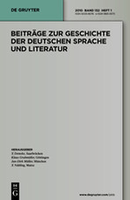
BEITRAGE ZUR GESCHICHTE DER DEUTSCHEN SPRACHE UND LITERATUR
Delving into the Depths of German Language HistoryBEITRAGE ZUR GESCHICHTE DER DEUTSCHEN SPRACHE UND LITERATUR is a distinguished scholarly journal published by Walter de Gruyter GmbH, focusing on the historical development of the German language and literature. With an ISSN of 0005-8076 and an E-ISSN of 1865-9373, this journal has been a pivotal resource for linguistic and literary scholars since its inception in 1874. Hailing from Germany, it serves as a critical platform for understanding the nuanced evolution of Germanic studies, contributing to its categorization in the Q4 and Q3 quartiles in Linguistics and Language and Literature and Literary Theory, respectively, as of 2023. Although not open access, the journal provides invaluable peer-reviewed content that fosters scholarly dialogue and research in its specialized fields, making it an essential read for researchers, professionals, and students dedicated to the richness of German linguistic heritage and literary analysis. The journal's extensive history and commitment to academic excellence position it as a key player in the ongoing discourse within the humanities.

DAPHNIS-ZEITSCHRIFT FUR MITTLERE DEUTSCHE LITERATUR
Advancing Scholarship in Literary HeritageDAPHNIS-ZEITSCHRIFT FUR MITTLERE DEUTSCHE LITERATUR, published by EDITIONS RODOPI BV, is a distinguished journal dedicated to the exploration and critical analysis of Middle German literature, offering scholars a dedicated platform to contribute to the field. With an ISSN of 0300-693X and an E-ISSN of 1879-6583, the journal has established itself as a vital resource for researchers and students alike, fostering academic discourse and advancing scholarship in literature and literary theory. Operating from the Netherlands, DAPHNIS holds a notable position in the academic community, currently categorized in the Q3 quartile of literature and literary theory, ranked in the 59th percentile among its peers on Scopus. The journal’s commitment to promoting critical insights and comprehensive studies makes it an essential reference point for anyone engaged in the literary academic landscape. While it is not currently open access, access options are available through institutional subscriptions, ensuring that valuable research is disseminated widely. For contributors and readers, DAPHNIS is not just an academic journal; it is a collaborative space where scholarship meets creativity, enriching the understanding of the rich tapestry of Middle German literature.
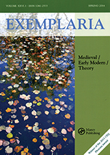
Exemplaria-Medieval Early Modern Theory
Cultivating Interdisciplinary Insights in Cultural StudiesExemplaria: Medieval Early Modern Theory is a distinguished journal within the fields of Cultural Studies, Linguistics and Language, and Literature and Literary Theory, published by Routledge Journals, Taylor & Francis Ltd. With an impressive Q1 ranking in Literature and Literary Theory and notable placements in associated disciplines, this journal serves as an essential platform for scholars dedicated to exploring the complexities of medieval and early modern texts and contexts. Established with a vision to stimulate interdisciplinary dialogue, Exemplaria has evolved from its initial years (1989-1995) to a renewed focus (2002-2024), consistently fostering significant contributions that shape contemporary literary discourse. Although currently not open access, the journal ensures broad reach and engagement through its meticulously curated articles, reviews, and critical essays that challenge traditional narratives and advocate for innovative methodologies. With the journal's ISSN 1041-2573 and E-ISSN 1753-3074, researchers, professionals, and students interested in advancing their understanding of literary traditions are encouraged to explore its rich repository of knowledge, which reflects the dynamic interplay between historical texts and modern interpretations.
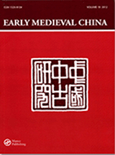
Early Medieval China
Illuminating the Rich Tapestry of Early Medieval ChinaEarly Medieval China is a distinguished journal published by ROUTLEDGE JOURNALS, TAYLOR & FRANCIS LTD, specializing in the intricate study of early medieval China through an interdisciplinary lens that encompasses Anthropology, Cultural Studies, History, Literature and Literary Theory, Philosophy, and Religious Studies. With a commendable impact factor and a prestigious standing in various quartile rankings, such as Q1 in Literature and Literary Theory and Q2 in Cultural Studies and History for 2023, this journal serves as a vital resource for scholars, researchers, and students alike. It aims to promote a deeper understanding of China's early medieval period by publishing innovative research, critical essays, and comprehensive analyses that contribute to the broader discourse on Asian studies and history. By offering a platform for cutting-edge research, Early Medieval China plays an essential role in enriching academic dialogue and fostering further explorations in this historically significant field.

Zeitschrift fur Katalanistik
Unveiling Insights in Linguistics and Literary TheoryZeitschrift für Katalanistik is a distinguished academic journal published by Albert Ludwig University in Germany, catering to the fields of Linguistics and Literature. With an impressive converged history from 2010 to 2023, this journal operates under rigorous academic scrutiny, as evidenced by its classification in the Q3 quartile for Linguistics and Q2 for Literature and Literary Theory. It holds a respectable ranking in the Scopus database, indicating its solid contribution to ongoing scholarly dialogue, particularly in the realms of both language and literary studies. Despite not currently offering Open Access options, the journal provides a vital platform for researchers, professionals, and students seeking to publish and explore contemporary issues in Katalan studies. With its comprehensive scope and academic rigor, Zeitschrift für Katalanistik remains an essential resource for anyone passionate about the intersection of Catalan language and literature.
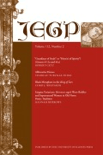
JOURNAL OF ENGLISH AND GERMANIC PHILOLOGY
Advancing Scholarship in English and Germanic StudiesJournal of English and Germanic Philology, published by University of Illinois Press, stands as a prestigious forum for scholarly discourse in the fields of linguistics and literary studies. With its ISSN 0363-6941 and an impressive impact factor aligning it within the Q1 and Q2 quartiles in key academic categories, this journal delves into nuanced explorations of both the English and Germanic languages, enriching the understanding of language and its literary frameworks. The journal aims to foster interdisciplinary dialogue, offering cutting-edge research that appeals not only to linguists and literary theorists but also to educators and cultural historians alike. Although the journal is not open access, its contributions are essential for anyone keen on enhancing their knowledge of linguistic phenomena and literary narratives from these influential linguistic traditions. With a commitment to publishing innovative and rigorous scholarship, the Journal of English and Germanic Philology is a vital resource for academics seeking to advance their work in language and literature.
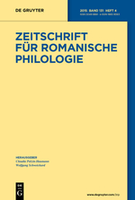
ZEITSCHRIFT FUR ROMANISCHE PHILOLOGIE
Unveiling the Heritage of Romance Languages Since 1877ZEITSCHRIFT FUR ROMANISCHE PHILOLOGIE, published by Walter de Gruyter GmbH, stands as a prominent peer-reviewed journal dedicated to the fields of Linguistics, Literature, and Literary Theory. Established in 1877 and continuing its legacy to the present day, this esteemed journal offers a platform for comprehensive scholarship that explores the intricacies of Romance languages and their literary heritage. With a notable Q1 ranking in Literature and Literary Theory and a Q2 ranking in Linguistics and Language, it has secured its place among leading resources in the humanities. Researchers, educators, and students benefit from its rich historical context and current contributions to the understanding of Romance languages and literature. Though currently not available as Open Access, the journal prioritizes the dissemination of high-quality research, making significant strides in fostering academic dialogue and advancement. Its address at Genthiner Straße 13, Berlin, Germany, situates it in a hub of scholarly activity, bridging the past with contemporary literary discourse.